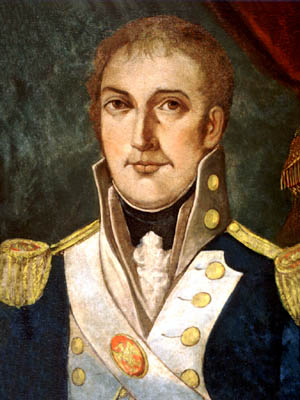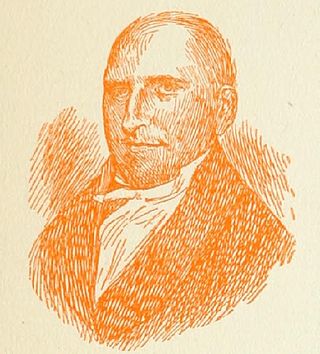Related Research Articles

The 5th United States Congress was a meeting of the legislative branch of the United States federal government, consisting of the United States Senate and the United States House of Representatives. It met at Congress Hall in Philadelphia, Pennsylvania, from March 4, 1797, to March 4, 1799, during the first two years of John Adams' presidency. In the context of the Quasi-War with France, the Alien and Sedition Acts were passed by Congress. The Acts were overwhelmingly supported by the Federalists and mostly opposed by the Democratic-Republicans. Some Democratic-Republicans, such as Timothy Bloodworth, said they would support formally going to war against France but they opposed the Alien and Sedition Acts which Bloodworth and others believed were unconstitutional.

The Northwest Territory, also known as the Old Northwest and formally known as the Territory Northwest of the River Ohio, was formed from unorganized western territory of the United States after the American Revolution. Established in 1787 by the Congress of the Confederation through the Northwest Ordinance, it was the nation's first post-colonial organized incorporated territory.

The Territory South of the River Ohio, more commonly known as the Southwest Territory or the old Southwest Territory, was an organized incorporated territory of the United States that existed from May 26, 1790, until June 1, 1796, when it was admitted to the United States as the State of Tennessee. The Southwest Territory was created by the Southwest Ordinance which was similar to the previous two ordinances passed by the Confederation Congress for the parallel establishment and development of the old Northwest Territory of 1786-1803. It pertained to lands situated north of the Ohio River, around the Great Lakes and extending west to the Mississippi River. The lands of the Territory were taken from western areas beyond the mountains of the Commonwealth of Virginia (later to be separated and erected into the new 15th state of the Commonwealth of Kentucky. Western lands were also ceded by the state of North Carolina from lands of the Washington District that had been already ceded to the U.S. federal government by North Carolina.

The Territory of Mississippi was an organized incorporated territory of the United States that was created under an organic act passed by both upper and lower chambers of the Congress of the United States, meeting at the United States Capitol on Capitol Hill, in the federal national capital city of Washington, D.C.. It was approved and signed into law by second President John Adams 1735-1826, served 1797-1801), on April 7, 1798.

William Charles Cole Claiborne was an American politician and military officer who served as the governor of Louisiana from April 30, 1812 to December 16, 1816. He was also possibly the youngest member of the United States Congress in the history of the United States, although reliable sources differ about his age.

Joseph Inslee Anderson was an American soldier, judge, and politician, who served as a United States Senator from Tennessee from 1797 to 1815, and later as the First Comptroller of the United States Treasury. He also served as one of three judges of the Southwest Territory in the 1790s, and was a delegate to the Tennessee state constitutional convention in 1796.

Archibald Roane was the second Governor of Tennessee, serving from 1801 to 1803. He won the office after the state's first governor, John Sevier, was prevented by constitutional restrictions from seeking a fourth consecutive term. He quickly became caught up in the growing rivalry between Sevier and Andrew Jackson, and was soundly defeated by Sevier after just one term. Roane served as an attorney general in the Southwest Territory in the early 1790s, and later served as a judge on the state's Superior Court of Law and Equity (1796–1801) and the Supreme Court of Errors and Appeals (1815–1819).

The United States District Court for the Western District of Tennessee is the federal district court covering the western part of the state of Tennessee. Appeals from the Western District of Tennessee are taken to the United States Court of Appeals for the Sixth Circuit.

The 1802–03 United States House of Representatives elections were held on various dates in various states between April 26, 1802 and December 14, 1803. Each state set its own date for its elections to the House of Representatives, either before or after the first session of the 8th United States Congress convened on October 17, 1803. They occurred during President Thomas Jefferson's first term in office.

The 1798–99 United States House of Representatives elections were held on various dates in various states between April 24, 1798 in New York and August 1, 1799 in Tennessee. Each state set its own date for its elections to the House of Representatives, with some after the official start of the 6th United States Congress on March 4, 1799, but before the start of the first session of this Congress in Philadelphia on December 2, 1799. These elections were held during President John Adams term. It was the last congressional session before the move to the new capital at Washington, D.C. Elections were held for all 106 seats, representing 16 states.

The Surveyor General of the Northwest Territory was a United States government official responsible for surveying land in the Northwest Territory in the United States late in the late 18th and early 19th century. The position was created in the Land Act of 1796 to survey lands ceded by Native Americans northwest of the Ohio River and above the mouth of the Kentucky River. This act, and those that followed evolved into the Public Land Survey System.

Thomas Hill Williams was a United States Senator from Mississippi, one of the first two senators from that state. He served two terms of office, from 1817 to 1829, retiring to Tennessee after his retirement from politics.

Silas Lee was a lawyer, judge, and United States Representative from Massachusetts. Born in Concord in the Province of Massachusetts Bay, he pursued classical studies and graduated from Harvard University in 1784. He studied law, was admitted to the bar, and was a member of the Massachusetts House of Representatives in 1793, 1797, and 1798.
The Jackson family is a family of politicians from the United States. Below is a list of members:

John McNairy was a British-American federal judge of the United States District Court for the District of Tennessee, the United States District Court for the Eastern District of Tennessee and the United States District Court for the Western District of Tennessee.

William Sanford Pennington was a United States Attorney for the District of New Jersey, an associate justice of the Supreme Court of New Jersey, the sixth governor of New Jersey and a United States district judge of the United States District Court for the District of New Jersey.

The 1803 United States Senate election in New York was held on February 1, 1803, by the New York State Legislature to elect a U.S. senator to represent the State of New York in the United States Senate.
United States Attorney for the District of Georgia is a defunct United States Attorney's office based in the state of Georgia until 1883. The U.S. Attorney for Georgia was the chief law enforcement officer for the United States District Court for the District of Georgia, one of the 13 original district courts. The district was succeeded by the United States Attorney for the Northern District of Georgia and the United States Attorney for the Southern District of Georgia.
William Preston Anderson (1774–1831) was a United States Attorney, colonel during the War of 1812, surveyor, and land speculator in Tennessee and Alabama, United States. He is best known today for his association with U.S. president Andrew Jackson and as the father of a general of the Confederate States Army.
References
- ↑ Executive Office for United States Attorneys (1989). Bicentennial Celebration of United States Attorneys, 1789–1989 (PDF) (Report). Washington, District of Columbia: United States Department of Justice. Retrieved 2023-06-19.
- ↑ Various; Jackson, Andrew (1980). Smith, Sam B.; Owsley, Harriet Chappell; Moser, Harold D. (eds.). The Papers of Andrew Jackson, Volume I, 1770–1803. Knoxville: University of Tennessee Press. ISBN 978-0-87049-219-8. LCCN 79015078. OCLC 5029597.
- ↑ Mero District - Charles A. Sherrill - Tennessee Encyclopedia - http://tennesseeencyclopedia.net/entries/mero-district/ Tennessee Historical Society March 1, 2018